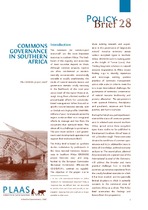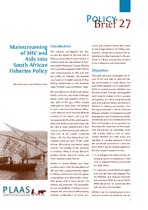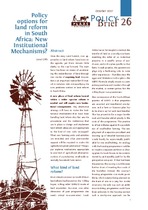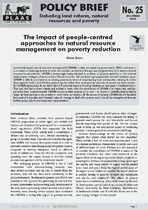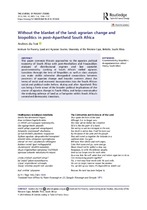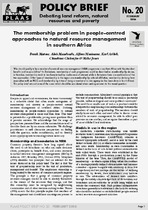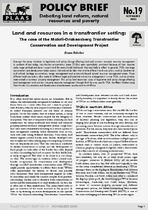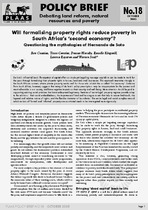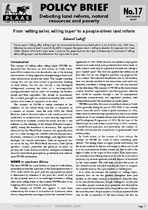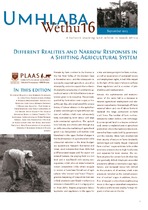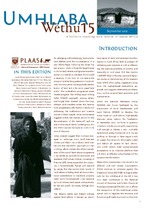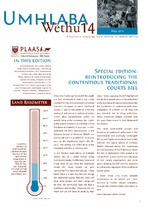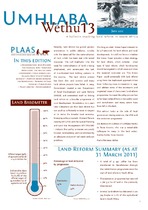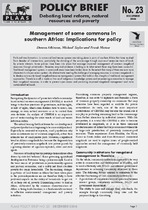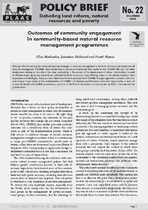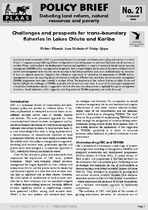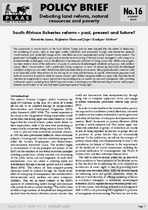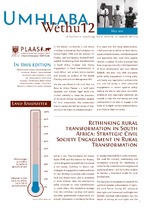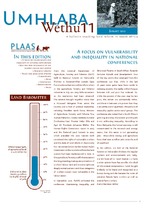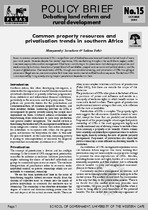Faculty of Economic and Management Sciences: Recent submissions
Now showing items 801-820 of 1101
-
Commons Governanace in South Africa
(Institute for Poverty, Land and Agrarian Studies, University of the Western Cape, 2009)The commons (or common-pool resources)1 are the most important resources in southern Africa. The livelihoods of the majority and economies of most countries depend on them. Although common property regimes are often ... -
Mainstreaming of HIV and Aids into South African Fisheries Policy
(Institute for Poverty, Land and Agrarian Studies, University of the Western Cape, 2008)This research investigated the drivers and the impact of HIV and Aids in fishing communities in South Africa, in order to assist the Department of Environmental Affairs and Tourism: Marine and Coastal Management ... -
Policy options for land reform in South Africa: New Institutional Mechanisms?
(Institute for Poverty, Land and Agrarian Studies, University of the Western Cape, 2007)Since the 2005 Land Summit, new approaches to land reform have been on the agenda, yet there remains little clarity on the way forward. The main focus has been on means of accelerating the redistribution of land ... -
The impact of people-centred approaches to natural resource management on poverty reduction
(Institute for Poverty, Land and Agrarian Studies, University of the Western Cape, 2006)Community-based natural resource management (CBNRM) is often promoted by governments, NGOs and donors as a means of reducing poverty in rural communities, particularly through income-generation from various natural res ... -
Without the blanket of the land: agrarian change and biopolitics in post–Apartheid South Africa
(Routledge, 2018)This paper connects Marxist approaches to the agrarian political economy of South Africa with post-Marshallian and Foucauldian analyses of distributional regimes and late capitalist governmentality. Looking at South ... -
The membership problem in people-centred approaches to natural resource management in Southern Africa
(Institute for Poverty, Land and Agrarian Studies, University of the Western Cape, 2006)Who should qualify to be a member of a natural resource management (NRM) programme in Southern Africa with the attendant benefits and responsibilities? In Zimbabwe, membership of such programmes could be described as ... -
Land and resources in a transfrontier setting
(Institute for Poverty, Land and Agrarian Studies, University of the Western Cape, 2005)Amongst the many initiatives in legislative and policy change affecting land and common property resource management in Southern Africa today, transfrontier conservation areas (TFCAs) seem particularly prominent because ... -
Will formalising property rights reduce poverty in South Africa’s ‘second economy’?
(Institute for Poverty, Land and Agrarian Studies, University of the Western Cape, 2005)De Soto’s influential book The mystery of capital offers a simple yet beguiling message: capitalism can be made to work for the poor, through formalising their property rights in houses, land and small businesses. This ... -
From ‘willing seller, willing buyer’ to a people-driven land reform
(Institute for Poverty, Land and Agrarian Studies, University of the Western Cape, 2005)The concept of ‘willing seller, willing buyer’ has dominated the discourse on land reform in South Africa since 1994. Now, following the national Land Summit of July 2005, it appears that government is willing to abandon ... -
Different realities and narrow responses in a shifting agricultural system
(PLAAS, 2013-09)Protests by farm workers in De Doorns in the Hex River Valley of the Western Cape in November 2012 – and the subsequent responses by organised agriculture, as well as attempts by unions to support the workers –illustrate ... -
Land redistribution: Part of a wider agrarian reform strategy
(PLAAS, 2012-09)An emerging and increasingly more prominent debate amid the considerations of a new White Paper, following the Green Paper process, which will set the legal framework for land reform and agrarian transformation, is whether ... -
Reintroducing the contentious Traditional Courts Bill
(PLAAS, 2012-05)When the Traditional Courts Bill [B15-2008] was first introduced in 2008 it was widely criticised for the nature and extent of judicial functions consigned to senior traditional leaders — and for the extent to which the ... -
Evictions from farms – the role of local government
(PLAAS, 2011-06)Recently, land reform has gained greater prominence in public debates, notably with the latest call for the nationalisation of land, which has been met with mixed responses. The call highlights why the need for nationalisation ... -
Management of some commons in southern Africa: Implications for policy
(Institute for Poverty, Land and Agrarian Studies, University of the Western Cape, 2006)Profound transformations in communal land tenure systems are taking place in parts of southern Africa that have resulted from decades of interventions, particularly the shrinking of the commonage through capture of extensive ... -
Outcomes of community engagement in community-based natural resource management programmes
(Institute for Poverty, Land and Agrarian Studies, University of the Western Cape, 2006)Although the last century has witnessed exciting strategies in resource management in the form of community-based natural resource management (CBNRM), these developments are more incremental than revolutionary. CBNRM falls ... -
Challenges and prospects for trans-boundary fisheries in Lakes Chiuta and Kariba
(Institute for Poverty, Land and Agrarian Studies, University of the Western Cape, 2006)Community-based conservation (CBC) is a prominent feature of conservation and development policy and practice in southern Africa. It is a generic concept defining different configurations of controlling access to and use ... -
South African fisheries reform – past, present and future?
(Institute for Poverty, Land and Agrarian Studies, University of the Western Cape, 2004)Two approaches to transformation of the South African fishery industry were adopted after the advent of democracy: the broadening of access rights to new rights holders (individuals and companies) through state intervention ... -
Rethinking rural transformation in South Africa
(PLAAS, 2011-05)In this edition we describe a civil society workshop convened by the Foundation for Human Rights (FHR) and the Institute for Poverty, Land and Agrarian Studies (PLAAS) entitled ‘Re-thinking Rural Transformation in South ... -
A focus on vulnerability and inequality in national conferences
(PLAAS, 2011-01)Since the national Department of Agriculture, Forestry and Fisheries (DAFF) held its National Summit on Vulnerable Workers in Somerset-West outside Cape Town to discuss better conditions for workers in the agriculture, ... -
Common property resources and privatisation trends in Southern Africa
(Institute for Poverty, Land and Agrarian Studies, University of the Western Cape, 2004)Access to common property resources (CPRs) is a significant part of the land resource base and therefore the livelihoods of many poor rural people. However, despite their central importance, CPRs are declining throughout ...

